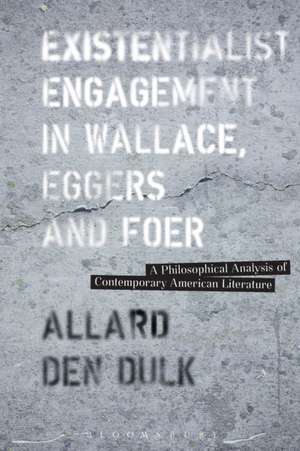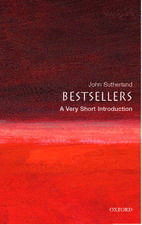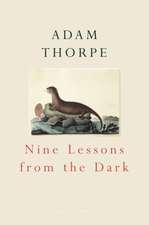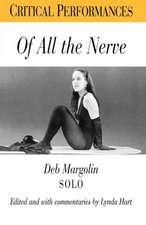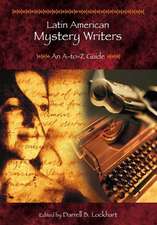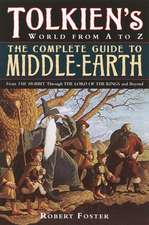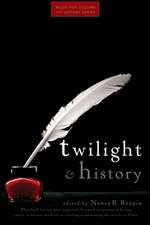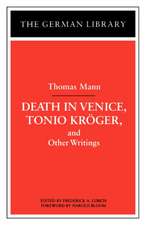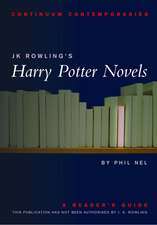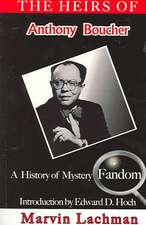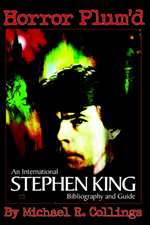Existentialist Engagement in Wallace, Eggers and Foer: A Philosophical Analysis of Contemporary American Literature
Autor Dr. Allard den Dulken Limba Engleză Paperback – 29 iun 2016
| Toate formatele și edițiile | Preț | Express |
|---|---|---|
| Paperback (1) | 258.89 lei 43-57 zile | |
| Bloomsbury Publishing – 29 iun 2016 | 258.89 lei 43-57 zile | |
| Hardback (1) | 775.09 lei 43-57 zile | |
| Bloomsbury Publishing – 11 feb 2015 | 775.09 lei 43-57 zile |
Preț: 258.89 lei
Preț vechi: 331.89 lei
-22% Nou
Puncte Express: 388
Preț estimativ în valută:
49.54€ • 51.85$ • 41.23£
49.54€ • 51.85$ • 41.23£
Carte tipărită la comandă
Livrare economică 31 martie-14 aprilie
Preluare comenzi: 021 569.72.76
Specificații
ISBN-13: 9781501322679
ISBN-10: 1501322672
Pagini: 320
Dimensiuni: 152 x 229 x 26 mm
Greutate: 0.43 kg
Ediția:NIPPOD
Editura: Bloomsbury Publishing
Colecția Bloomsbury Academic
Locul publicării:New York, United States
ISBN-10: 1501322672
Pagini: 320
Dimensiuni: 152 x 229 x 26 mm
Greutate: 0.43 kg
Ediția:NIPPOD
Editura: Bloomsbury Publishing
Colecția Bloomsbury Academic
Locul publicării:New York, United States
Caracteristici
Combines philosophy and literature in order to shed light on how the so-called 'dead end' of postmodernism might be overcome via existentialist insights
Notă biografică
Allard den Dulk is Lecturer in Philosophy, Literature and Film at Amsterdam University College, The Netherlands.
Cuprins
List of Abbreviations AcknowledgmentsForeword Introduction 1. Aims and Method 2. An 'Aesthetic Sea-Change' in American Literature 3. Outline of Primary Literary Works 4. Heuristic Perspectives 5. Outline of the Study PART I PROBLEMS Chapter 1 - Hyperreflexivity Introduction 1. Factors of Heightened Contemporary Reflexivity 2. Sartre's View of Consciousness and Self-Reflection 3. The Alienation of Self-Reflection Conclusion Chapter 2 - Endless Irony Introduction 1. Irony as an Attitude towards Existence 2. Irony as Negative Independence3. Endless 'Aesthetic' Irony 4. Meta-Irony Conclusion PROBLEMATIC FICTIONChapter 3 - Postmodernist Metafiction: John Barth Introduction 1. Metafiction 2. Deconstruction and Metafiction Conclusion Chapter 4 - Postmodernist Minimalism: Bret Easton Ellis Introduction 1. General Comparison 2. Four Aspects of the Escalation of Ironic-Aesthetic Existence 3. A Continuation of Reflexive Irony Conclusion PART II ENGAGED FICTIONChapter 5 - Wittgenstein and Wallace: The Meaning of Fiction Introduction 1. Wittgenstein: The Temptation of Essences 2. Wittgenstein: The Irrelevance of Essences 3. The Virtues of the Late-Wittgensteinian Language View 4. A Late-Wittgensteinian View of Fiction Conclusion ENGAGEMENTChapter 6 - Sincerity Introduction 1. Sincerity vs. Authenticity 2. Sincerity: A Sartrean, Existentialist Ideal 3. Cases of Sincerity: The Fiction of Wallace, Eggers and Foer Conclusion Chapter 7 - Reality-Commitment Introduction 1. The Realization of Choice: Freedom, Despair, Urgency 2. The Reality of the Self as Gift and Task 3. Reality as Repetition Conclusion Chapter 8 - Community Introduction 1. Absurdity and Rebellion: Two Main Themes of Camus's Thought 2. The Role of the Other: Kierkegaard and Sartre vs. Camus 3. Discovering the Other: Wallace, Eggers and Foer 4. Towards a Dialogic Community of Meaning Conclusion Concluding Remarks 1. Literature and Philosophy 2. Existentialist Engagement 3. Love Me Till My Heart Stops? Works Cited
Recenzii
[Existentialist Engagement in Wallace, Eggers and Foer] has the merit of addressing both neophytes and professionals.... The newcomer can look here for a to-the-point analysis of the essence of what Wallace and New-Sincerity studies have set down in the last decade. The expert, on the other end, finds a precious contribution to the on-going discussion on the subject via an in-depth research into philosophy that hadn't yet been undertaken in such an extensive and thorough manner. But most importantly, den Dulk's work resonates of passion. This monograph constitutes, rightfully so, the author's own existentialist engagement with his own field of study and with life in general. This is a very good book, probably the best I've read in Wallace studies.
What Den Dulk does very well with his particular existentialist framework, and with this particular trio of creative writers, is illustrate the movement between literature and philosophy as pursued in contemporary American fiction with great commitment and great flair. In so doing he illustrates ethical as well as existential promise, that 'the new sincerity' remains an opportunity for fiction and philosophy both.
Existentialist Engagement in Wallace, Eggers and Foer will be of much interest to scholars of the so-called 'New Sincerity,' as well as to scholars operating at the increasingly popular intersection of literature and philosophy. ... Dulk's book effectively and repeatedly demonstrates that a philosophical approach can be a productive way to deal with such explicitly philosophical writers as Wallace and less explicitly philosophical writers like Eggers and Foer. ... Dulk admits at the outset that a project like his 'is always selective and can never be all-embracing'. Certainly, the exclusions of Dulk's study do not prevent him from his stated task 'to bring out the philosophical views implied in these novels' by these authors. Nor do Dulk's self-imposed limits keep him from making important contributions to larger critical and philosophical discussions.
In this important philosophical study ... Allard den Dulk (Amsterdam University College) provides a timely contribution to the debates surrounding what comes 'after' postmodernism ... Den Dulk has provided a valuable contribution to Wallace Studies specifically. More generally, his book is an admirable, stoic defence of the traditional "function of literature" ... that attempts to engage with reality and thus "realize a meaningful, human life".
Allard den Dulk has written the best study I've read of the vexed intersection of sincerity, hyperreflexivity, and community in contemporary American fiction. Drawing on a sequence of unpublished interviews with Eggers, Foer, and Wallace, and matching those insights to a philosophically informed analysis, den Dulk gives us a powerful way to think about Wallace's legacy and the changing topography of the American novel.
One hears a great deal of flimsy talk about the 'new sincerity' in American literary fiction. In Existentialist Engagement in Wallace, Eggers, and Foer, Allard den Dulk transforms that flimsy talk into rigorous, methodical scholarship. Expanding on his already important work on David Foster Wallace and Soren Kierkegaard, den Dulk walks the reader through not only the key novels of his three primary fiction writers but also the foundational existentialist texts that inform these groundbreaking novels. In these lucid close readings, den Dulk demonstrates that Wallace and company aren't just trying to connect with readers; rather, they are conducting an informed and urgent existentialist critique of postmodernism and poststructuralism.
Existentialist Engagement in Wallace, Eggers and Foer is an intoxicating journey through the philosophical underpinnings in the fiction of David Foster Wallace, Dave Eggers, and Jonathan Safran Foer. With gusto, Allard Den Dulk steers the reader through a postmodern landscape of 'hyperreflexivity and endless irony.' Yet where we may expect a dull and easy acceptance of thrill-seeking nihilism, Den Dulk's conclusion is more passionate and surprising. Existentialist Engagement makes philosophy riveting again. This book is required reading for anyone who wants to understand 21st-century American fiction and who can stomach a thrilling ride.
Allard den Dulk's book is a thorough and insightful study of some of America's most influential contemporary novelists. Reading their work with great attention, Den Dulk rediscovers exitentialist philosophy as being more relevant than ever for the understanding of the world of today, as it is fathomed by Wallace, Eggers and Foer. A highly stimulating intellectual adventure.
Because of den Dulk's careful attention to philosophical influences, nuanced readings of how Wallace, Eggers, and Foer build from such influences to address existential struggles in the late twentieth century and early twenty-first century, and careful renderings of consistent literary thematic emphases on sincerity and community, his monograph will appeal to scholars invested in providing a more substantial philosophical basis for literature of the so-called 'new sincerity'.
Existentialist Engagement remains a welcome addition to the body of Wallace Studies, as much for its articulacy and insights as for the questions it raises about what comes next.
What Den Dulk does very well with his particular existentialist framework, and with this particular trio of creative writers, is illustrate the movement between literature and philosophy as pursued in contemporary American fiction with great commitment and great flair. In so doing he illustrates ethical as well as existential promise, that 'the new sincerity' remains an opportunity for fiction and philosophy both.
Existentialist Engagement in Wallace, Eggers and Foer will be of much interest to scholars of the so-called 'New Sincerity,' as well as to scholars operating at the increasingly popular intersection of literature and philosophy. ... Dulk's book effectively and repeatedly demonstrates that a philosophical approach can be a productive way to deal with such explicitly philosophical writers as Wallace and less explicitly philosophical writers like Eggers and Foer. ... Dulk admits at the outset that a project like his 'is always selective and can never be all-embracing'. Certainly, the exclusions of Dulk's study do not prevent him from his stated task 'to bring out the philosophical views implied in these novels' by these authors. Nor do Dulk's self-imposed limits keep him from making important contributions to larger critical and philosophical discussions.
In this important philosophical study ... Allard den Dulk (Amsterdam University College) provides a timely contribution to the debates surrounding what comes 'after' postmodernism ... Den Dulk has provided a valuable contribution to Wallace Studies specifically. More generally, his book is an admirable, stoic defence of the traditional "function of literature" ... that attempts to engage with reality and thus "realize a meaningful, human life".
Allard den Dulk has written the best study I've read of the vexed intersection of sincerity, hyperreflexivity, and community in contemporary American fiction. Drawing on a sequence of unpublished interviews with Eggers, Foer, and Wallace, and matching those insights to a philosophically informed analysis, den Dulk gives us a powerful way to think about Wallace's legacy and the changing topography of the American novel.
One hears a great deal of flimsy talk about the 'new sincerity' in American literary fiction. In Existentialist Engagement in Wallace, Eggers, and Foer, Allard den Dulk transforms that flimsy talk into rigorous, methodical scholarship. Expanding on his already important work on David Foster Wallace and Soren Kierkegaard, den Dulk walks the reader through not only the key novels of his three primary fiction writers but also the foundational existentialist texts that inform these groundbreaking novels. In these lucid close readings, den Dulk demonstrates that Wallace and company aren't just trying to connect with readers; rather, they are conducting an informed and urgent existentialist critique of postmodernism and poststructuralism.
Existentialist Engagement in Wallace, Eggers and Foer is an intoxicating journey through the philosophical underpinnings in the fiction of David Foster Wallace, Dave Eggers, and Jonathan Safran Foer. With gusto, Allard Den Dulk steers the reader through a postmodern landscape of 'hyperreflexivity and endless irony.' Yet where we may expect a dull and easy acceptance of thrill-seeking nihilism, Den Dulk's conclusion is more passionate and surprising. Existentialist Engagement makes philosophy riveting again. This book is required reading for anyone who wants to understand 21st-century American fiction and who can stomach a thrilling ride.
Allard den Dulk's book is a thorough and insightful study of some of America's most influential contemporary novelists. Reading their work with great attention, Den Dulk rediscovers exitentialist philosophy as being more relevant than ever for the understanding of the world of today, as it is fathomed by Wallace, Eggers and Foer. A highly stimulating intellectual adventure.
Because of den Dulk's careful attention to philosophical influences, nuanced readings of how Wallace, Eggers, and Foer build from such influences to address existential struggles in the late twentieth century and early twenty-first century, and careful renderings of consistent literary thematic emphases on sincerity and community, his monograph will appeal to scholars invested in providing a more substantial philosophical basis for literature of the so-called 'new sincerity'.
Existentialist Engagement remains a welcome addition to the body of Wallace Studies, as much for its articulacy and insights as for the questions it raises about what comes next.
